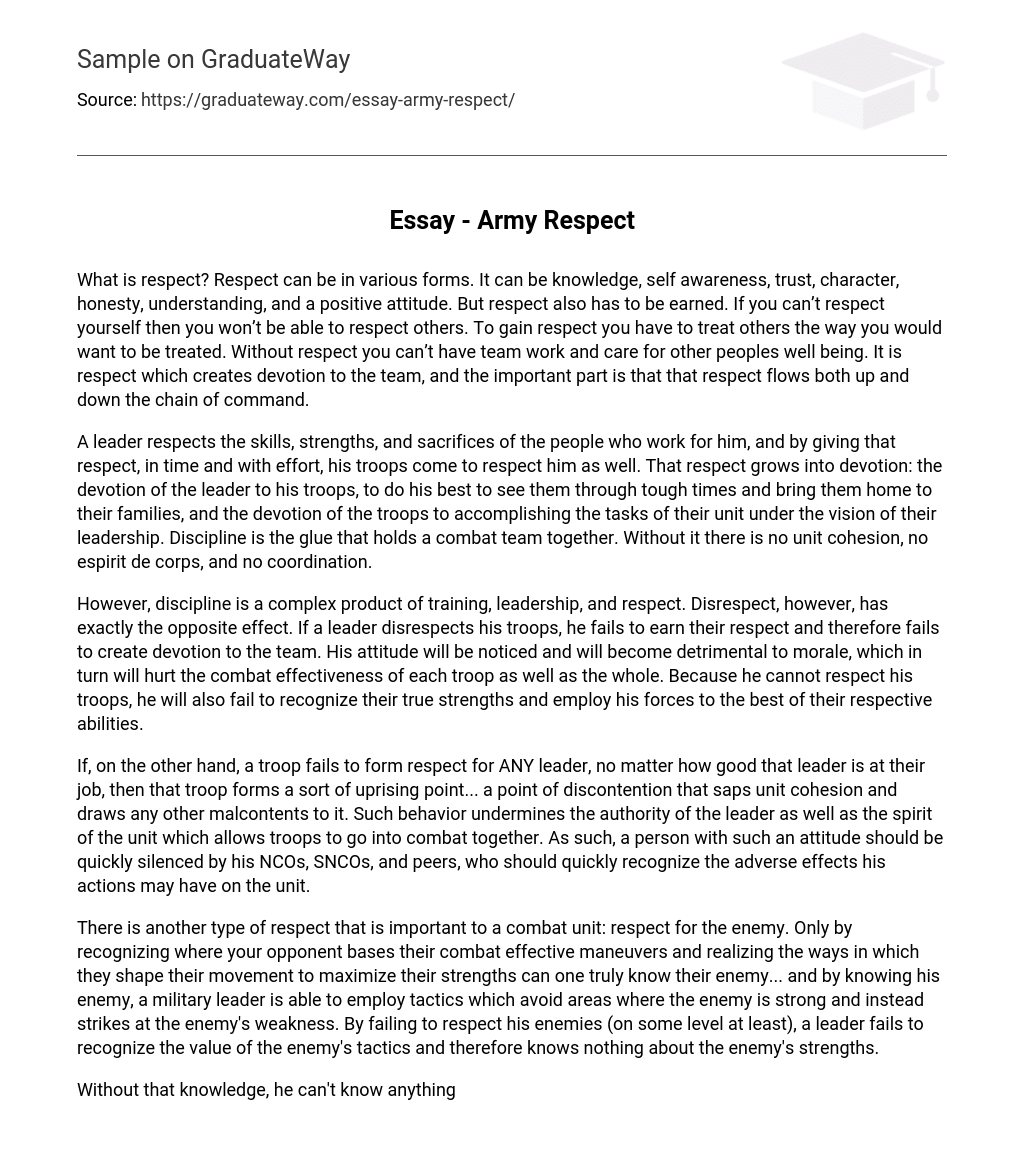Respect is a complex idea that includes knowledge, self-awareness, trust, character, honesty, understanding, and a positive attitude. Nevertheless, it is important to understand that respect needs to be earned. To respect others, you must first have self-respect. The key to earning respect is treating others with the same consideration you expect for yourself. Respect is vital for promoting teamwork and showing care for others’ well-being. It also forms the basis for loyalty within a team; importantly, respect exists both vertically and horizontally in the chain of command.
Respecting the skills, strengths, and sacrifices of those who work for a leader ultimately leads to the troops respecting the leader. This respect then turns into devotion, where the leader is committed to supporting and protecting the troops, while the troops are dedicated to accomplishing their unit’s tasks under their leader’s guidance. Discipline is vital for maintaining unit cohesion, esprit de corps, and coordination within a combat team.
However, discipline is a complex result of training, leadership, and respect. Conversely, disrespect has the opposite effect. If a leader disrespects their troops, they will not earn their respect and therefore will not be able to foster devotion to the team. This attitude will be observed and will negatively impact morale, which will ultimately harm both individual soldiers and the entire unit’s combat effectiveness. Furthermore, by failing to respect their troops, the leader will also be unable to acknowledge their true strengths and effectively utilize their respective abilities.
If a troop does not develop respect for any leader, regardless of their competence, it becomes a point of dissent and disrupts unit cohesion. This behavior undermines the authority of the leader and weakens the unity of the unit during combat. Therefore, individuals displaying such attitudes must be promptly addressed by their NCOs, SNCOs, and peers, who should recognize the negative impact their actions may have on the entire unit.
Another crucial type of respect that holds significant importance within a combat unit is demonstrating respect towards the enemy. The only way to truly understand the adversary is by acknowledging where they strategically position themselves and comprehending how they maneuver to effectively leverage their strengths. This knowledge enables military leaders to devise tactics that steer clear of areas where the enemy holds advantage and instead target their vulnerabilities. By disregarding the enemy and failing to respect them to some extent, a leader neglects the significance of their tactics and ultimately remains oblivious to the capabilities possessed by the enemy.
Without possessing this knowledge, he is unable to attain any genuine understanding of the potential disposition of enemy forces, their movements in the field, and the locations where it would be imprudent to launch an assault. Consequently, each endeavor necessitates greater exertion and sacrifice from his own faction and inadvertently furthers the well-executed strategies of the adversary. Although such a predicament can be surmounted, it demands additional resources beyond what would typically be required. Irrespective of military division, the strength of a unit hinges solely on its weakest link. The morale of said unit is frequently quantified by the esteem enlisted personnel hold for their superiors.
Disrespect leads to low morale and decreased performance/productivity in the unit. Respect is a fundamental building block of the United States Army’s Ecosystem, along with loyalty, duty, selfless service, honor, integrity, and personal courage. The order of these army values does not indicate their relative importance; it simply serves as a mnemonic device to ingrain these core values in our minds.
The acronym D.R.S.H.I.P, also referred to as “Leadership,” highlights the interconnectedness of its value traits. When loyalty is lacking, respect is also absent since a disloyal team member demonstrates disrespect and fails to contribute. Respect, which involves recognizing someone’s worth or excellence, relies on both self-loyalty and loyalty toward others.
While serving in the United States Army, it is crucial to recognize that respect should not be based solely on an individual’s rank. The worth of a person cannot be determined exclusively by their rank. However, when lower enlisted soldiers engage with Non-commissioned Officers (NCOs), they are anticipated to demonstrate appropriate respect towards the NCO by acknowledging and honoring their rank.
This hierarchical design is intended to maintain order based on qualification and experience. Upon arrival at Fort Hood, soldiers receive the Phantom Warrior Standard book that emphasizes the significance of courtesy and respect in preserving military discipline. I now comprehend that there were instances when I displayed disrespect towards my NCO’s, and I sincerely apologize for my conduct. I will strive harder to manage my temper and, if needed, participate in an anger management program. Furthermore, my spouse will support me at home by aiding in cultivating patience and improving anger management abilities.





